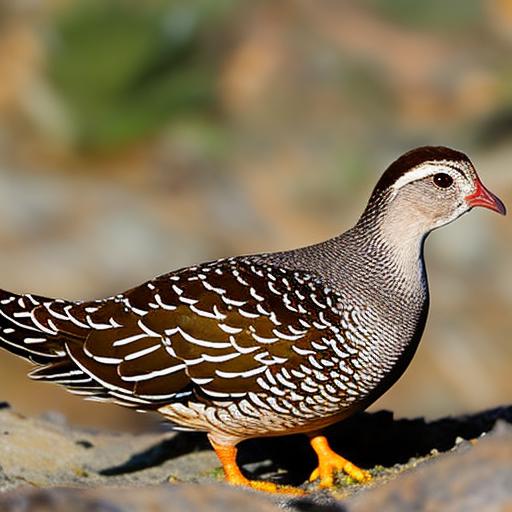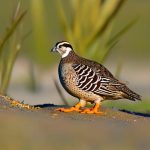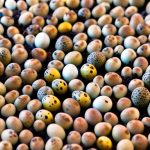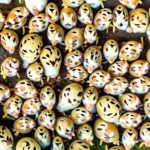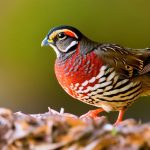The Jumbo Pharaoh Quail, also known as Coturnix coturnix, is a popular breed of quail that is known for its large size and gentle nature. These quails are native to Europe, Asia, and Africa and have been domesticated for centuries. They are often kept for their meat and eggs, as well as for their charming personalities. Jumbo Pharaoh Quail are easy to care for and can thrive in a variety of environments, making them an ideal choice for both experienced and novice bird keepers.
Jumbo Pharaoh Quail are known for their striking appearance, with a mottled brown and white plumage that is both beautiful and functional. They are also known for their friendly and sociable nature, making them a great addition to any backyard or farm. These quails are also prolific layers, producing small, speckled eggs that are prized for their rich flavor. Whether you are interested in raising quail for meat, eggs, or simply as pets, the Jumbo Pharaoh Quail is a versatile and rewarding choice.
Key Takeaways
- Jumbo Pharaoh Quail are a popular breed known for their large size and high egg production.
- Providing a spacious and clean environment with proper ventilation is crucial for the health and well-being of Jumbo Pharaoh Quail.
- A balanced diet including high-quality feed, fresh water, and occasional treats like fruits and vegetables is essential for the nutrition of Jumbo Pharaoh Quail.
- Regular health checks, vaccination, and proper hygiene practices are important for preventing diseases and maintaining the wellness of Jumbo Pharaoh Quail.
- Understanding the breeding behavior and providing the right conditions can help in successful reproduction of Jumbo Pharaoh Quail.
Choosing the Right Environment for Jumbo Pharaoh Quail
When it comes to keeping Jumbo Pharaoh Quail, choosing the right environment is crucial to their health and well-being. These quails are hardy birds that can adapt to a variety of climates, but they do require some specific conditions to thrive. First and foremost, Jumbo Pharaoh Quail need a secure and predator-proof enclosure to keep them safe from predators such as cats, dogs, and birds of prey. This can be achieved with a sturdy wire mesh or netting that is buried into the ground to prevent digging.
In addition to a secure enclosure, Jumbo Pharaoh Quail also need access to fresh air and sunlight. A well-ventilated coop or aviary with plenty of natural light is essential for their overall health. It’s also important to provide them with a clean and dry living space, as damp conditions can lead to respiratory issues and other health problems. Finally, Jumbo Pharaoh Quail need plenty of space to roam and forage. A minimum of one square foot of space per bird is recommended, but more space is always better. Providing them with a natural substrate such as sand or straw will also allow them to engage in natural behaviors like dust bathing and scratching.
Feeding and Nutrition for Jumbo Pharaoh Quail
Feeding and nutrition are crucial aspects of caring for Jumbo Pharaoh Quail. These birds have specific dietary needs that must be met in order for them to thrive. A high-quality game bird feed that is specifically formulated for quail is the best option for providing them with the essential nutrients they need. This feed should contain a balanced mix of protein, vitamins, and minerals to support their overall health and well-being.
In addition to a commercial feed, Jumbo Pharaoh Quail also benefit from a variety of fresh foods such as fruits, vegetables, and greens. These can be offered as treats or supplements to their regular diet to provide them with additional nutrients and enrichment. It’s important to avoid feeding them any toxic or harmful foods such as avocado, chocolate, or caffeine, as these can be deadly to quail.
Finally, providing access to clean water at all times is essential for the health of Jumbo Pharaoh Quail. Water should be provided in a shallow dish or trough that is easy for them to access without getting wet or soiled. Keeping their water clean and free of debris will help prevent the spread of disease and ensure that they stay hydrated.
Health and Wellness for Jumbo Pharaoh Quail
Maintaining the health and wellness of Jumbo Pharaoh Quail is essential for their long-term happiness and productivity. Regular health checks are important for catching any potential issues early on. This includes monitoring their weight, behavior, and overall appearance for any signs of illness or distress. If you notice any changes in their behavior or appearance, it’s important to consult with a veterinarian who has experience with poultry.
In addition to regular health checks, providing a clean and sanitary living environment is crucial for preventing disease and parasites. Regularly cleaning their coop or aviary, providing fresh bedding, and removing any soiled or moldy food will help keep them healthy and happy. It’s also important to practice good biosecurity measures to prevent the spread of disease between birds.
Finally, providing enrichment and mental stimulation is important for the overall well-being of Jumbo Pharaoh Quail. This can include providing them with toys, perches, and hiding spots to encourage natural behaviors such as scratching, pecking, and exploring. Providing them with plenty of space to roam and forage will also help keep them mentally and physically stimulated.
Breeding and Reproduction of Jumbo Pharaoh Quail
Breeding Jumbo Pharaoh Quail can be a rewarding experience for bird keepers who are interested in expanding their flock or producing quail for meat or eggs. These birds reach sexual maturity at around 6-8 weeks of age, at which point they will begin laying eggs. To encourage breeding, it’s important to provide them with a suitable nesting area that is dark, quiet, and secluded.
Once the female quail begin laying eggs, they will typically lay one egg per day until they have laid a clutch of around 8-12 eggs. It’s important to collect these eggs daily to prevent them from being damaged or eaten by the quail. The eggs can then be placed in an incubator or under a broody hen for hatching.
Incubating quail eggs typically takes around 17-18 days, after which the chicks will hatch. It’s important to provide the chicks with a warm and safe environment to grow and develop. A brooder with a heat lamp or heating pad is essential for keeping the chicks warm during their first few weeks of life.
Common Challenges and Solutions for Keeping Jumbo Pharaoh Quail

While Jumbo Pharaoh Quail are relatively easy to care for, there are some common challenges that bird keepers may encounter when raising these birds. One common issue is aggression between male quail, especially during breeding season. To prevent fighting and injuries, it’s important to provide plenty of space and hiding spots within the enclosure so that the males can establish their own territories.
Another common challenge is egg eating, which can occur when quail become bored or stressed. To prevent this behavior, it’s important to provide them with plenty of enrichment and mental stimulation. Collecting eggs regularly can also help prevent them from being damaged or eaten by the quail.
Finally, maintaining a clean and sanitary living environment is crucial for preventing disease and parasites. Regularly cleaning their coop or aviary, providing fresh bedding, and removing any soiled or moldy food will help keep them healthy and happy. It’s also important to practice good biosecurity measures to prevent the spread of disease between birds.
Conclusion and Final Tips for Keeping Jumbo Pharaoh Quail in San Diego
In conclusion, keeping Jumbo Pharaoh Quail can be a rewarding experience for bird keepers in San Diego. These birds are easy to care for and can provide meat, eggs, or simply companionship for those who choose to raise them. By providing them with a secure environment, a balanced diet, regular health checks, and plenty of mental stimulation, bird keepers can ensure that their Jumbo Pharaoh Quail thrive in their care.
Some final tips for keeping Jumbo Pharaoh Quail in San Diego include providing them with plenty of shade during the hot summer months, as well as protection from cold drafts during the winter. It’s also important to check local regulations regarding keeping quail in your area, as some neighborhoods may have restrictions on keeping poultry.
Overall, with proper care and attention, Jumbo Pharaoh Quail can be a delightful addition to any backyard or farm in San Diego. Their charming personalities, beautiful plumage, and delicious eggs make them a versatile and rewarding choice for bird keepers of all experience levels.
If you’re interested in keeping jumbo Pharaoh quail in San Diego, you may also want to consider how to properly insulate their coop for optimal comfort and health. Check out this informative article on how to insulate a chicken coop for valuable tips and insights on creating a suitable environment for your quail.
FAQs
What are jumbo Pharaoh quail?
Jumbo Pharaoh quail are a breed of domesticated quail known for their large size and prolific egg-laying capabilities. They are often raised for their meat and eggs.
How do you keep jumbo Pharaoh quail in San Diego?
To keep jumbo Pharaoh quail in San Diego, you will need a suitable enclosure with proper ventilation, bedding, and nesting areas. Additionally, you will need to provide them with a balanced diet, clean water, and protection from predators.
What do jumbo Pharaoh quail eat?
Jumbo Pharaoh quail eat a diet consisting of commercial quail feed, supplemented with fresh greens, fruits, and vegetables. They also require access to grit for digestion.
What are the housing requirements for jumbo Pharaoh quail?
Jumbo Pharaoh quail require a secure and spacious enclosure with proper ventilation, protection from the elements, and nesting areas. The enclosure should also have a clean and dry bedding material.
How do you care for jumbo Pharaoh quail in San Diego?
Caring for jumbo Pharaoh quail in San Diego involves providing them with a balanced diet, clean water, suitable housing, and protection from predators. Regular health checks and proper hygiene practices are also essential for their care.
Meet Walter, the feathered-friend fanatic of Florida! Nestled in the sunshine state, Walter struts through life with his feathered companions, clucking his way to happiness. With a coop that’s fancier than a five-star hotel, he’s the Don Juan of the chicken world. When he’s not teaching his hens to do the cha-cha, you’ll find him in a heated debate with his prized rooster, Sir Clucks-a-Lot. Walter’s poultry passion is no yolk; he’s the sunny-side-up guy you never knew you needed in your flock of friends!

